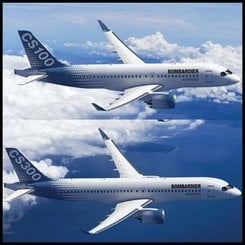Canadian train and plane maker Bombardier resumes CSeries flights in September. The company is certain its new jet will be in commercial service late in 2015.
Engine failure during stationary maintenance tests in May 2014 delayed the multi-billion program throughout the summer. The jet was damaged after debris from the engine was ejected and hit the airframe. The defect was traced to the engine’s oil system.
Bombardier executives say the aircraft will be flying again within the next few days, but did not specify exactly when.
CBC News quoted Chris Murray, an analyst at AltaCorp Capital who said he heard that flights might resume as early as Sunday.
The Montreal-based aeronautics firm says it has modified the engines and successfully completed the necessary testing required for a return to flight.
Rob Dewar, Vice President of the CSeries program, said he was still confident that entry-into-service will occur in the second half of next year. “Following the pause of the CSeries aircraft flight test program on May 29, 2014, Pratt & Whitney and Bombardier finalized a solution that Pratt has since incorporated into the engine’s oil lubrication system,” he said. Pratt & Whitney makes the PW1524G engines for the CSeries.
One test airplane will start flying this month and others will join later in the fall as they receive new engines, the company said. To win certification, the CSeries needs to do 2,400 hours of flight tests. So far, it has only completed 330 hours.
Development risks remain high
RBC Dominion Securities analyst Walter Spracklin said in a note Friday that development risks are still high, given that the delay will probably last about four months before the first test plane flies, meaning the company’s six-month buffer for contingencies has been mostly used up.

On Friday, Bombardier shares increased by 2.2% for a short period, but at the end of trading closed 0.55% down at C$3.63.
Apart from this recent flight-testing glitch, the CSeries program has been riddled with other interruptions as well as higher-than-expected costs.
The 110-seater CS100 was originally set to be delivered at the end of last year, but was delayed by software issues.
Swedish-based Braathens Aviation AB recently announced that it no longer wishes to be the first recipient of the aircraft because of the uncertainty surrounding the program. However, it did not cancel the order placed in 2011 for five CS100 and five CS300, costing C$655 million, with options for two extra airplanes.
Most analysts are betting on another delay in entry-into-service.
The Bombardier CSeries
The Bombardier CSeries is a family of medium-range, narrow-body, twin-engine jet aircraft.
There are two models:
- The 100-seat CS100 (originally called the C110),
- The 135-seat CS300 (originally called the C130).
The CSeries competes directly with Airbus’ A320 family, Boeing’s 737 series, and the Embraer 195 regional jet. The Canadian aircraft maker says its planes use 20% less fuel.
Video – Bombardier CSeries update
In this Bombardier video, CSeries Aircraft’s Vice President and General Manager Rob Dewar provides an update on the CSeries program.
